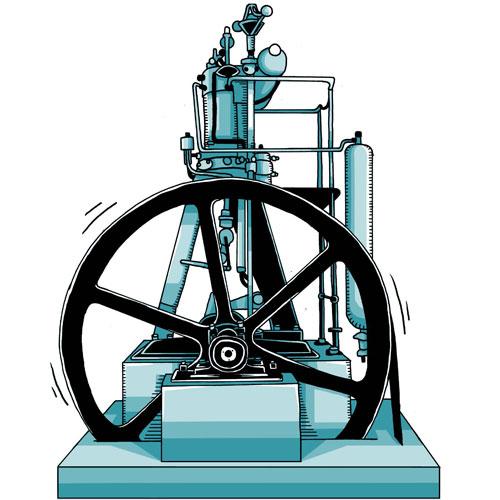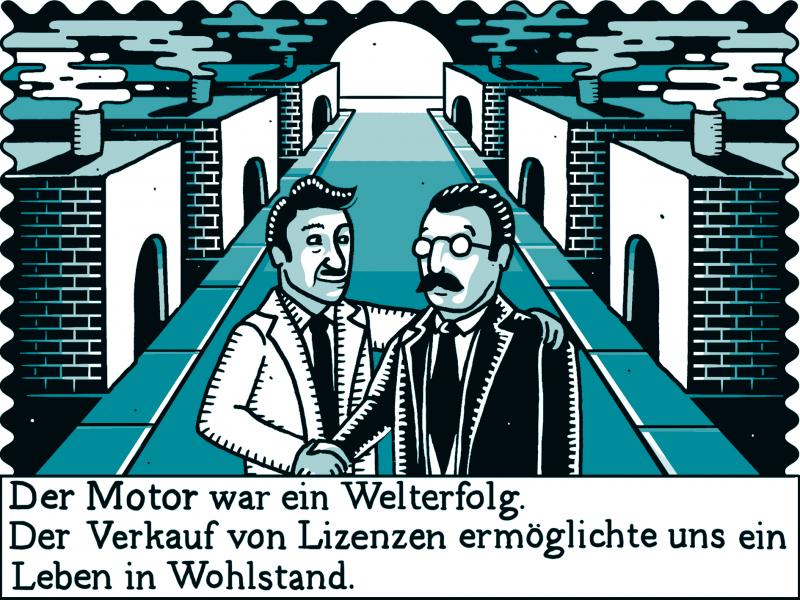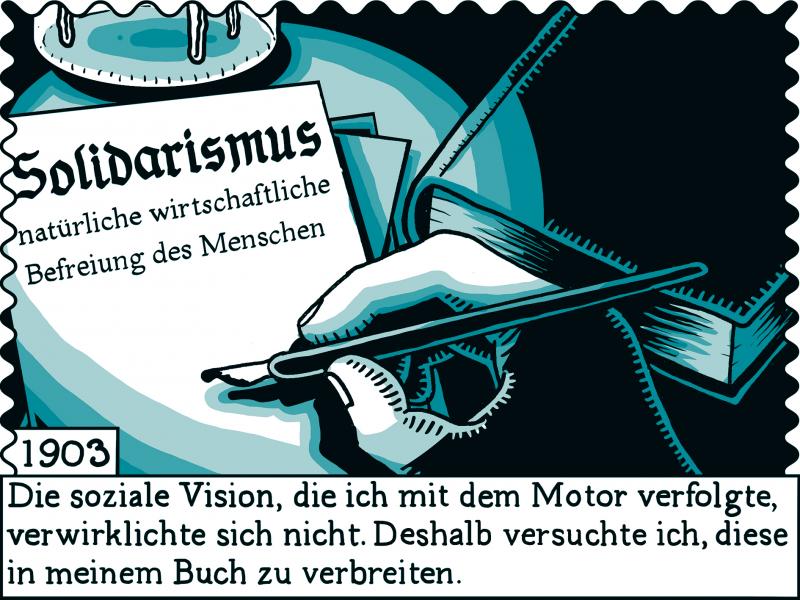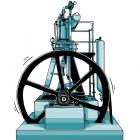In the early twentieth century, most ships were powered by coal and steam. This changed abruptly in 1911, when Winston Churchill decided to power his new fleet of warships with oil. This decision shifted the attention of world superpowers toward the Near East and its oil reserves, which had a significant impact on world history.
The real rise of the diesel engine began after the Second World War. It was built into almost all types of ships and became a driving force of globalization. Today, 90 percent of world trade is transported on ships across the oceans. About 90,000 container ships transport commodities daily and burn up to one billion liters of fuel, mostly crude oil. Although various other vehicles and machines are powered by diesel engines, its consequences for the Anthropocene are most evident in the shipping industry.

Drawn by Bastian Wienecke, 2014.
 This work is licensed under a Creative Commons Attribution-NonCommercial-NoDerivatives 4.0 International License.
This work is licensed under a Creative Commons Attribution-NonCommercial-NoDerivatives 4.0 International License.
Diesel’s last letter: The Diesel engine
Text and images by Bastian Wienecke
University of the Arts (UdK), Berlin

Diesel’s last letter
1913: “Beloved Martha, in this letter I want to explain to you the thoughts that have been running through my head recently.”
Diesel’s last letter
1913: “Beloved Martha, in this letter I want to explain to you the thoughts that have been running through my head recently.”
Drawn by Bastian Wienecke, 2014.  This work is licensed under a Creative Commons Attribution-NonCommercial-NoDerivatives 4.0 International License.
This work is licensed under a Creative Commons Attribution-NonCommercial-NoDerivatives 4.0 International License.

1890: “The steam engine was the motor of industrialization, yet it was much too large and expensive.”
1890: “The steam engine was the motor of industrialization, yet it was much too large and expensive.”
Drawn by Bastian Wienecke, 2014.  This work is licensed under a Creative Commons Attribution-NonCommercial-NoDerivatives 4.0 International License.
This work is licensed under a Creative Commons Attribution-NonCommercial-NoDerivatives 4.0 International License.

“Smaller labor companies couldn’t compete. So I developed a cheaper alternative for them that would give them a good future.”
“Smaller labor companies couldn’t compete. So I developed a cheaper alternative for them that would give them a good future.”
Drawn by Bastian Wienecke, 2014.  This work is licensed under a Creative Commons Attribution-NonCommercial-NoDerivatives 4.0 International License.
This work is licensed under a Creative Commons Attribution-NonCommercial-NoDerivatives 4.0 International License.

1893: “The engine didn’t rely on crude oil or natural gas. Instead, it used vegetable oil. It was considerably more efficient.”
1893: “The engine didn’t rely on crude oil or natural gas. Instead, it used vegetable oil. It was considerably more efficient.”
Drawn by Bastian Wienecke, 2014.  This work is licensed under a Creative Commons Attribution-NonCommercial-NoDerivatives 4.0 International License.
This work is licensed under a Creative Commons Attribution-NonCommercial-NoDerivatives 4.0 International License.

“The engine was a global success. Selling licenses to the engine made it possible for us to live in prosperity.”
“The engine was a global success. Selling licenses to the engine made it possible for us to live in prosperity.”
Drawn by Bastian Wienecke, 2014.  This work is licensed under a Creative Commons Attribution-NonCommercial-NoDerivatives 4.0 International License.
This work is licensed under a Creative Commons Attribution-NonCommercial-NoDerivatives 4.0 International License.

“But, the fact that my invention was of the greatest interest to the military makes me mad. Nothing is further from my mind than war.”
“But, the fact that my invention was of the greatest interest to the military makes me mad. Nothing is further from my mind than war.”
Drawn by Bastian Wienecke, 2014.  This work is licensed under a Creative Commons Attribution-NonCommercial-NoDerivatives 4.0 International License.
This work is licensed under a Creative Commons Attribution-NonCommercial-NoDerivatives 4.0 International License.

Solidarism - the natural economic liberation of man
1903: “The societal vision that I had for the engine never manifested. That’s why I tried to spread my ideas in my book.”
Solidarism - the natural economic liberation of man
1903: “The societal vision that I had for the engine never manifested. That’s why I tried to spread my ideas in my book.”
Drawn by Bastian Wienecke, 2014.  This work is licensed under a Creative Commons Attribution-NonCommercial-NoDerivatives 4.0 International License.
This work is licensed under a Creative Commons Attribution-NonCommercial-NoDerivatives 4.0 International License.

1913: “No one was interested in my ideas. This really takes a toll on me, and I still have to learn how to live with this reality. “
1913: “No one was interested in my ideas. This really takes a toll on me, and I still have to learn how to live with this reality. “
Drawn by Bastian Wienecke, 2014.  This work is licensed under a Creative Commons Attribution-NonCommercial-NoDerivatives 4.0 International License.
This work is licensed under a Creative Commons Attribution-NonCommercial-NoDerivatives 4.0 International License.
Artist’s comment:
I was surprised to learn that when Rudolf Diesel invented the diesel engine, his primary mission was to improve the life of the common worker and not to fill his own pockets with money. He was frustrated about not being able to realize his vision. It was important to me that my comic strips portray how his invention and its consequences affected its creator.
How to cite
Wienecke, Bastian. “Diesel Engine.” Environment & Society Portal, Multimedia Library, 2014. http://www.environmentandsociety.org/node/6636/.
The comic also appears in Alexandra Hamann, Reinhold Leinfelder, Helmuth Trischler, and Henning Wagenbreth, eds., Anthropozän – 30 Meilensteine auf dem Weg in ein neues Erdzeitalter. Eine Comic-Anthologie (Munich: Deutsches Museum, 2014).
This work is licensed under a Creative Commons Attribution-NonCommercial-NoDerivatives 4.0 International License.


